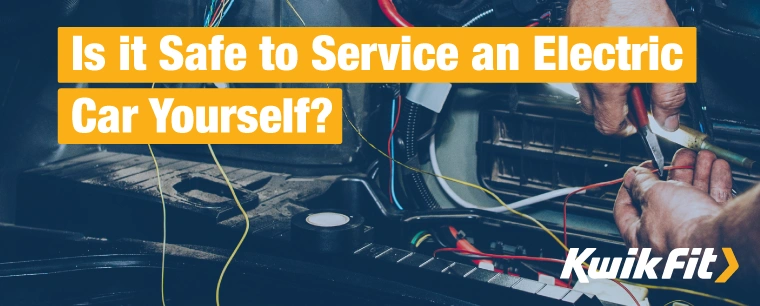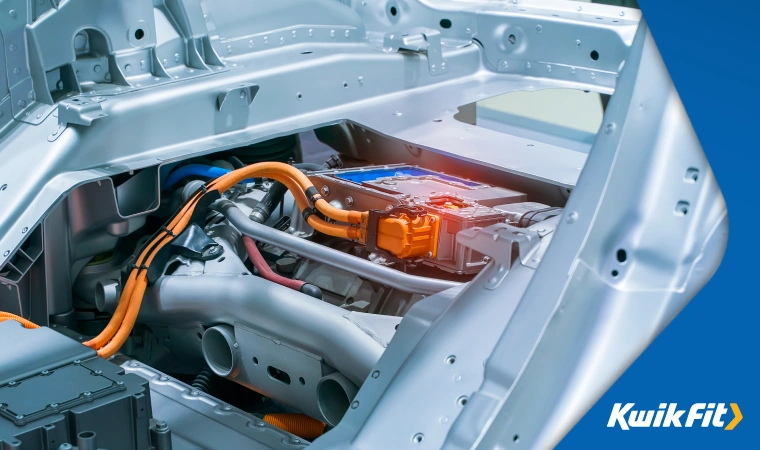Is It Safe to Service an Electric Car Yourself?
Jack Dreyer | Tuesday 11th October 2022 9:00am

Keeping your car ship-shape with small DIY jobs has a history as long as cars have existed. Itís almost a romantic task, getting mucky on your driveway while changing a part, but can you do the same with electric vehicles?
In some cases, yes Ė but electric vehicles pose much more significant dangers to DIY servicing than traditional combustion engine vehicles do. Letís look at why.
The main differences between Combustion Engine & Electric Vehicles

The obvious, biggest difference between EVs and Combustion Engine Vehicles (CEVs) is that the latter has, well, a combustion engine while the other has an electric motor. The less obvious difference between the two is that an engine takes up a lot of room that an electric motor doesnít. But the overall components for an electric vehicle take up room in different ways.
Essentially, all you need for an engine to run is a reasonably sized fuel tank and an engine. For an electric motor, you need the motor itself but also quite a large battery bank.
Now, these battery banks are usually made out of Lithium Ion cells Ė which are significantly lighter than older lead-acid batteries, but the energy requirements of moving a vehicle necessitate a lot of cells. So, these are usually built into the base of the EV and made to run along the whole length of it in order to evenly distribute the weight.
The other main difference is in the level of technology present in each vehicle Ė while many new CE cars have high-tech gadgets, the vast majority of CE vehicles are content with TPMS & reverse sensors as the height of tech. On the other hand, almost every electric vehicle on the market makes use of sophisticated tech like ADAS, parking assist systems, autonomous driving, 360į camera vision, advanced alarm & camera systems, and more.
A minor fault or accidentally-unplugged cable in any of these can be a real nightmare to diagnose.
So, the question of whether itís safe to service an electric car yourself is more a question of whether you have enough knowledge to fiddle with all of the sensors and gizmos and put them back in the same place.
Combustion Engine vehicles are inert when turned off

Letís get to safety.
While there are lots of moving parts, and certainly parts you donít want to get your fingers trapped in, when you turn off a traditional vehicle, itís off. Which means you can touch pretty much anything (using some common sense) without fear of getting hurt.
Even a traditional car battery, being only 12 volts, is unlikely to give you a serious shock Ė though you should still be careful and never wear jewellery around car batteries.
An electric vehicle, on the other hand, isnít quite the same. Unless the battery bank has been fully disconnected (which is quite a process), itís always ďonĒ. Which means you could touch the wrong thing and, potentially, lose your life.
Tesla batteries operate at a voltage of 450v, which is twice that of UK domestic mains voltage. When you think about how easy it is to create devastating effects with ill-advised DIY home electricals, itís quite scary to think how easily the worst could happen when playing around with EV electrics.
Trust the experts
Because of the very real safety implications involved with servicing EVs, our technicians have to be specifically trained and certified to work on any electric vehicle. So we highly recommend you donít take the risk and instead trust your carís reliability on our reliable experts.
Any facts, figures and prices shown in our blog articles are correct at time of publication.
Featured Articles
Is it Illegal to Drive With One Headlight?
Saturday 19th July 2025
Wondering if itís illegal to drive with one headlight? Learn about the safety risks and penalties of illegal blown bulbs and why you should fix them promptly.
Air Con in EVs & Hybrids: Experts Answer Your Questions
Monday 30th June 2025
Does air con drain EV batteries? Can you use the air con while charging an electric car? Find out the answers to these questions & more from Kwik Fitís experts.
Why Is Your Car Making a Noise? Fixes & Tips
Friday 13th June 2025
When your car starts making unexpected noises, it can certainly be quite disconcerting; it may be nothing to worry about, but hereís what you need to know.









